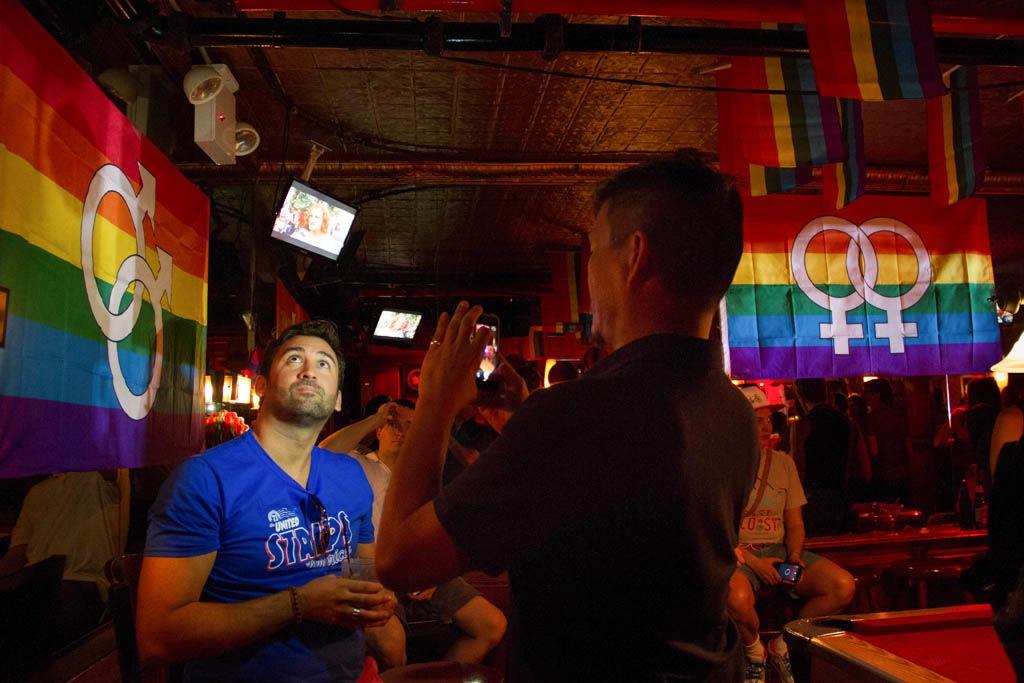One year after DOMA repeal, marriage equality gaining momentum nationwide
Benjamin has his partner take a photograph of him against the backdrop of an LGBT flag with two interlocking male gender symbols at the center, inside New York City’s Stonewall Inn, on June 26, 2013. The couple was celebrating the Supreme Court ruling, which that afternoon struck down the Defense of Marriage Act. When the decision was announced, hundreds spilled out of work and into the landmark bar, which is the site of the 1969 Stonewall Riots and birthplace of the 1970s Gay Liberation Front.
One year after the Supreme Court struck down section three of the Defense of Marriage Act (DOMA) — to many a cheer from the LGBT community, and simultaneous warnings by conservative groups that the decision would “create a firestorm of opposition” — marriage equality has been on a winning streak, and the rainbow flag can be found flying in 19 states between the US coasts.
It’s now clear the ruling did not “explode and just break this nation apart,” as Tony Perkins, the president of the Christian conservative Family Research Council, famously predicted. The firestorm never came.
In fact, the decision seems to have influenced just the opposite kind of movement.
President Obama’s administration last Friday called on various new benefits for same-sex couples everywhere — including those living in states where gay marriage is still illegal — that range from work leave to care for sick spouses to Social Security and veterans benefits.
The Veterans Affairs Department, marred by controversy as it may be, will now allow LGBT spouses of veterans to be buried beside them in a national cemetery.
The Social Security Administration will begin processing spousal survivor and death benefits claims for those living in states where same-sex marriage is illegal, but civil union or domestic partnership is not.
The Labor Department will also start outlining its own set of new rules to extend the rights under the Family and Medical Leave Act to same-sex couples.
Since the 2013 ruling, same-sex spouses living in equal marriage states have become eligible for all of Medicare’s benefits — hospitalization, delayed filing and prescription drug subsidy. Those who live in states where same-sex marriage is not recognized are also entitled to almost all of these benefits.
A recent poll conducted by Alex Lundry, Mitt Romney’s former data director, found that 56 percent of respondents supported gay marriage and only 37 percent opposed. Of those who said they opposed gay marriage, 58 percent said they would not do anything to resist should gay marriage ever really become the all-consuming national boogeyman some said it would be.
Even Bill Clinton, who signed DOMA into law in 1996, has come out to support the overturning of legislation that denied legally married same-sex couples over 1,000 protections and responsibilities of marriage.
“One year ago this week, the United States Supreme Court declared DOMA unconstitutional. It was the right thing to do. Seventeen years after signing DOMA into law, I was honored and grateful to be among the voices urging that it be overturned,” Clinton said in a statement. “The Supreme Court’s decision would not have happened without Edie Windsor’s dogged determination to right a wrong and Roberta Kaplan’s equal commitment to simple fairness. As marriage equality spreads across the states, the number of people impacted by these two amazing women will only continue to grow.”
Edith, often affectionately referred to as “Edie,” Windsor married Thea Spyer in Ontario, Canada, in 2007. When Spyre died two years later, she left her entire estate to Windsor — then living in New York, where their marriage was legally recognized. When Windsor tried to claim exemption from the federal estate tax, the one granted to surviving spouses, she was denied because section three of DOMA excluded same-sex partners in its definitions of “marriage” and “spouse.”
She had paid $363,053 in estate taxes, according to the official Supreme Court decision, and requested a refund, which the Internal Revenue Service (IRS) later denied.
Windsor challenged the denial by bringing the refund to suit under the charge that “DOMA violates the principles of equal protection incorporated in the Fifth Amendment.” While the suit was pending, the Department of Justice (DOJ) decided it would no longer defend the legislation’s constitutionality, and the Bipartisan Legal Advisory Group (BLAG) of the House of Representatives decided to intervene in its stead.
The District Court ruled against the US and ordered the Treasury to provide the refund, with interest, but the Treasury never complied. And so Windsor v. United States went to the Supreme Court and became the landmark case that would catapult equal marriage into the limelight, resulting in 22 consecutive wins since June 2013 — 16 in federal court and four in state court.
Nineteen states, plus Washington, DC, now allow same-sex marriage. In another 12 states, judges have ruled in favor of marriage equality and many of them are “stayed as they proceed to appellate courts.” Judges in nine states, including some which are known for their conservatism, have ruled against marriage bans and there are currently 74 ongoing cases in 32 states or territories, according to information tracked by Freedom to Marry.
Nearly 44 percent of Americans today live in states that allow same-sex marriage and over 46 percent live in states with either equal marriage or civil union and domestic partnership.
We’d love to hear your thoughts on The World. Please take our 5-min. survey.
